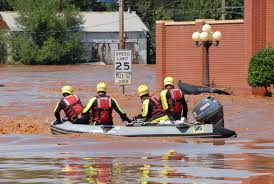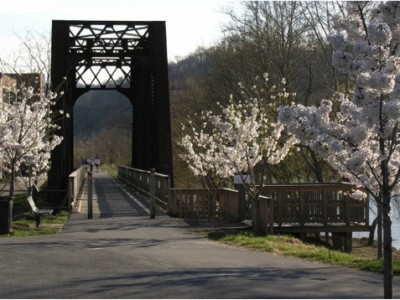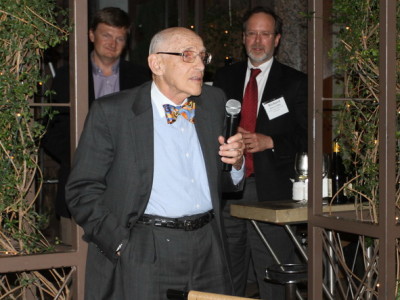Sea Level Rises, Premiums Not So Much
Congress apparently just couldn't resist restoring subsidies for coastal homeowners.
The President has now signed an important modification of the flood insurance program. The changes are hard to understand, in part because the bill changed an earlier 2013 law that itself amended the basic statute. So you have to work through the whole sequence to see what is going on. Before I go into more details, there seem to be three major changes: 1. The original law provided subsidized rates (roughly, at half price) for buildings that were there when a...
CONTINUE READINGReduced VMT from Millennials: Good News From an Unlikely Source
Younger people are driving less, even controlling for the flat economy
Last week I reported on the Caltrans survey findings showing that Californians seem to be driving less. Too good to be true? Perhaps. My always-pessimistic colleague Brian Taylor suspects that this is more about the Great Recession than about real changes in driving habits. Brian and his colleagues at the University of California Transportation Center recently issued a report closely connected with this issue, and sure enough, it finds that economic factors a...
CONTINUE READINGThe Perils of Rail Transit and Democracy
How Decentralized Decision-Making Can Screw Up Rail Planning and Implementation
Americans seem to love democracy but hate many of the results. We want governmental power to be decentralized, whether it's across three federal branches or with local control over sometimes regionally oriented land use decisions. But when the inevitable compromise that is required to get majority approval means a less-than-perfect result, from Obamacare to budget deals, or when it means no results at all, such as congressional gridlock, we complain and threaten to vote ...
CONTINUE READINGCalifornia’s Path to 2050
Recent research shows that California can meet its 2050 climate goals at an affordable cost.
Could California make deep cuts in carbon by 2050 (80% below 1990 levels)? Are the economics feasible? Those are important questions for California, but they also have a lot to say about what's feasible for the U.S. and other developing countries as a whole. Last December, UC Davis hosted a forum on the models that researchers use to address these models. The modeling work has been done in various places, including UC Berkeley, Lawrence Berkeley National Laborat...
CONTINUE READINGTwo good recent articles on environmental law
Regulating diffuse harms is a key future challenge for environmental law
JOTWELL is a blog dedicated to highlighting some of the best, recent legal scholarship. I recently posted a review there of two excellent recent articles in environmental law -- I think they're both terrific because they both highlight what I think will be an increasingly important issue in the future of environmental law: How we manage or regulate large numbers of actions that cause environmental harms that are individually small, but collectively large. Climate cha...
CONTINUE READINGAre Californians Finally Getting Out of Our Cars?
If Something Looks Too Good To Be True, Then It Probably Is
It looks like a miracle: Californians aren't depending quite as heavily on cars for commutes and errands as they did a decade ago, according to a new survey by Caltrans. Although driving is still by far the most dominant mode of transportation across the state, accounting for about three-quarters of daily trips, researchers say a decrease in car usage and a rise in walking, biking and taking transit indicate that Californians' daily habits could be slowly...
CONTINUE READINGRand Paul versus Clean Water
Rand Paul's plan to cut wetlands protection and make enforcement against polluters impossible.
Rand Paul recently won a big victory in the straw poll held by CPAC,the Conservative Political Action Conference. In the environmental area, his signature measure is the Defense of Environment and Property Act. On its surface, the goal of the law is to cut back on federal jurisdiction over wetlands. The bill would drastically cut back on federal protection for wetlands, small streams, and rivers in the Western United States. But its stealth provisions are even worse...
CONTINUE READINGNew Environmental Law Rankings Place UCLA Law and Berkeley Law in Top 10
Rankings Reflect Colleagues' Recognition
U.S. News and World Report, the most visible ranker of graduate programs, publishes its ranking of environmental law programs at U.S. law schools each spring, and the new list is out. Berkeley Law is ranked #3, and UCLA Law is ranked #10 - the first time we have cracked the Top 10. Along with Georgetown, we are the only three Top-20 law schools among the Top 10 ranked environmental law programs this year. Berkeley's environmental law program is perennially highly-...
CONTINUE READINGU.S. Supreme Court Deals Blow to National Rails-to-Trails Movement
Justices Hand Property Owners Another Important Win, With Public Access the Loser
Some U.S. Supreme Court decisions blow through American jurisprudence like a hurricane. Others slip into the law books quietly, like the proverbial cat's paws. Today's Court decision in Marvin M. Brandt Revocable Trust v. United States falls into the latter category: largely overlooked by Court followers and the media, but with the potential to have profound, long-term impacts on public access rights, land use trends and private property rights. The facts of Bran...
CONTINUE READINGIn Memoriam: Joseph L. Sax, Gentleman, Scholar, Giant of Environmental Law
Visionary environmental advocate will be sorely missed, long remembered.
[Posted on behalf of all Legal Planet authors at Berkeley Law.] It is with great sadness that we share the news of the passing of Joseph L. Sax, James H. House and Hiram H. Hurd Professor of Environmental Regulation (Emeritus) at Berkeley Law. Joe was our hero, our teacher, our mentor, our colleague, our friend. We will miss his intellectual vigor and creativity, and the gentle way he approached even the most potentially divisive issues. We will do our best to carry ...
CONTINUE READING









